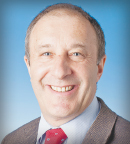
Jonathan Ledermann, MD
Formal discussant Jonathan Ledermann, MD, of UCL Cancer Institute University College London, commented on both phase III trials. He was enthusiastic about the SOLO-1 results: “Perhaps, we really are seeing a cure in some of these patients.” He noted that overall survival is still not fully mature, and more time is needed to confirm these findings.
In SOLO-1, the 7-year survival rates were not quite statistically significant, he noted. “However, 90% stopped the PARP inhibitor at 2 years, and here we are looking at the 7-year time point with a sustained survival benefit of around 20% compared with the placebo group. This occurred in the face of a 44% crossover rate in the placebo group, and this is a big clinically meaningful difference. Only a handful of patients required subsequent treatment between 5 and 7 years, suggesting a proportion of patients might be cured,” Dr. Ledermann said.
“PAOLA-1 confirmed a survival benefit in the [homologous recombination deficiency (HRD)] group with olaparib added to bevacizumab. This was particularly relevant to the HRD-positive BRCA wild-type group, where a 10% difference in survival was seen at 5 years,” he continued. “Not all BRCA-positive patients are the same, as recurrences occurred in both trials. It will be important to determine why 55% of these patients required further therapy.”
“What we can conclude [from both of these trials] is that these survival data confirm the value of biomarker-directed first-line therapy with maintenance PARP inhibitors—here with olaparib—in the treatment of ovarian cancer,” Dr. Ledermann stated.
DISCLOSURE: Dr. Ledermann reported a consulting or advisory role with Amgen, Artios, AstraZeneca, Clovis Oncology, Esai, GlaxoSmithKline UK Ltd, Merck, Tesaro, and VBL Therapeutics; served on a speakers bureau for AstraZeneca, Clovis Oncology, Eisai, Pfizer, and Tesaro; received research funding from AstraZeneca and MSD Oncology; and served on an Independent Data Monitoring Committee for Regeneron.



